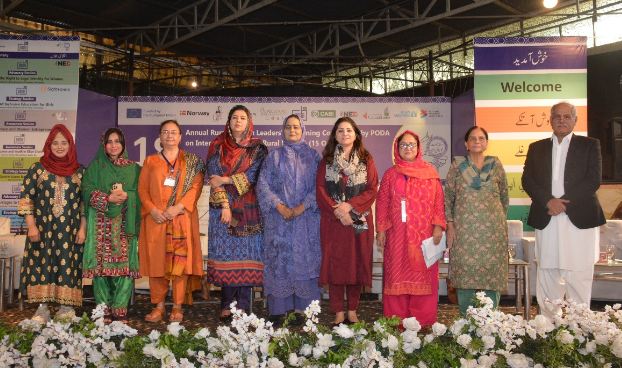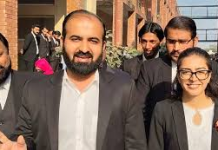ISLAMABAD, OCT 15 /DNA/ – Speaking at the inaugural plenary of the 18th Rural Women Leadership Training Conference held at Lok Virsa, Islamabad, PODA leader from Khanewal, Bismillah Iram, said: “Despite losing everything in the recent floods, the hopes and dreams of rural women in Pakistan remained unshaken. With resilience, we stood firm to rebuild our lives. We thank PODA for supporting us in this journey. We, the village women, are the unsung heroes—protecting cities at the cost of our own lives and livelihoods.” The conference will be concluded on Friday 17 October.
Sameena Nazir, Executive Director of PODA, welcomed over 500 women leaders from around 100 districts across Pakistan, including delegates from all four provinces—Balochistan, Khyber Pakhtunkhwa, Punjab, and Sindh—as well as from AJK and Gilgit-Baltistan. Harroona Jatoi, renowned educationist, and Mumtaz Eskar, members of PODA’s Board of Directors, also extended a warm welcome, acknowledging the vital role these women play in promoting community rights, social justice, and grassroots empowerment.
Moazma Yousaf, representing NADRA, emphasized that identity is a vital contract between the state and its citizens, essential for accessing rights and services—especially during crises like floods. She highlighted NADRA’s efforts to improve birth registration through hospitals and primary healthcare systems. While NADRA has achieved 98 percent identity coverage for adults over 18, child birth registration remains a challenge, with current coverage at 46 percent due to societal barriers. She stressed the importance of increasing registration, particularly for girls, and the critical role organizations like PODA play in this effort.
Iza Rajpar conveyed President Asif Ali Zardari’s message, reaffirming the PPP’s dedication to women’s empowerment, as envisioned by Shaheed Benazir Bhutto, through initiatives like the Benazir Income Support Programme. In his message, Prime Minister Shehbaz Sharif paid tribute to Pakistan’s pioneering women leaders and reaffirmed the government’s commitment to empowering rural women through education, healthcare, skills training, and sustainable livelihoods, acknowledging their vital role in national development.
Harroona Jatoi, renowned educationist, and Mumtaz Eskar, members of PODA’s Board of Directors, warmly welcomed the women leaders, recognizing their crucial roles in advancing community rights and empowerment. Lok Virsa Executive Director Dr. Muhammad Waqas Saleem expressed his gratitude to the participants and highlighted the essential contributions of women to the country’s development and progress, emphasizing their role as drivers of national growth and empowerment.
Naheeda Abbasi, social activist, moderated a session on “Promoting the Right to Legal Identity for Women and Girls and Protection from Gender-Based Violence.” Speakers included Shandana Humayun Khan (CEO, Rural Support Programmes Network), Saeed Nisa (youth leader and footballer from Kalash, Chitral), Asifa Jamali (Member, Voter Education Committee, Nasirabad), Fazila (transgender representative from Badin), Sidra Hameed (Christian community representative, Eva Welfare Organization, Gujranwala) and Farkhanda Aurangzeb (Member, NCHR, Balochistan). Huma Irshad, wheelchair-user heads Shine Welfare Foundation, Gujranwala stressed on the need to enhance efforts to ensure legal identity of persons-with-disabilities.
They emphasized that legal identity – beginning with birth registration and a national identity card – is essential for accessing justice and securing fundamental rights. They also emphasized the importance of birth registration and the issuance of identity cards as essential steps in ensuring legal identity and protecting women and girls from discrimination and violence.
Nighat Siddique, Director of Gender and Disability at the Election Commission of Pakistan (ECP), highlighted the Commission’s ongoing efforts to enhance the political participation of women, transgender persons, persons with disabilities, and youth, with the aim of strengthening democracy at the grassroots level. While addressing the session, Zafarullah Khan humbly remarked, “At a women’s conference, I am honored to be in the minority as a man.” He emphasized that identity cards are essential for accessing services such as voting, driving, banking, and financial transactions, and should not be viewed merely as a form of charity.
Chairperson of the National Commission on the Status of Women (NCSW), Umme Leila Azhar, paid tribute to the women leaders who have tirelessly worked for the progress of their communities. She highlighted the completion of the first-ever agri-census, providing reliable data to inform policies and reforms for rural women. She also commended Sameena Nazir for consistently organizing the conference since 2008, which has grown into a powerful voice advocating for women’s rights. Here is a revised, precise, and coherent version of your text, preserving all the key details and integrating your requested changes:
The session titled “Educational and Advocacy Session for the Rights of the Girl Child” served as a vital platform to spotlight key issues surrounding girls’ education, health, and inclusion in Pakistan. Anchored in Sustainable Development Goal (SDG) 4 on Quality Education and SDG 5 on Gender Equality, the session fostered critical dialogue on expanding girls’ right to education, ensuring access to menstrual hygiene services, improving nutritional support for adolescent girls, and promoting inclusive services for girls with disabilities.
The session featured powerful insights from a diverse panel of experts and advocates who shared challenges, case studies, and success stories from across the country. Rukhshanda Naz (former Ombudsperson, KP) co-chaired the session with Dr. Shahida Rehmani, MNA and Chairperson of the Women’s Parliamentary Caucus.
Dr. Shahida Rehmani said that in Sindh, under her leadership, all efforts are being made to recognize and amplify the often overlooked contributions and voices of women and girls in the country’s progress.
Uzma Batool, representing UNICEF, said the organization maintains a strong focus on the girl child throughout all phases of her life. She highlighted initiatives such as adolescent alliance forums across Pakistan, the need for tax-free sanitary pads, life-based skills training, and improved digital access to strengthen girls’ livelihoods. She emphasized child protection at federal and provincial levels, enforcement of child rights, and the importance of implementing the Beijing Platform for Action. Stressing that all girls must be in school, she called for an intergenerational approach to transform gender relations by involving commissions, departments, religious scholars, health experts, and civil society. She said girls should be seen as agents of change, especially in the context of climate-related disasters and other adversities, rather than as victims.
Speakers also underscored the need for community-based strategies to end early marriage and harmful practices that undermine girls’ development. From the grassroots level, Ms. Bismillah Irum, Head of Roshan Rahien, Khanewal, shared inspiring stories of girls reclaiming their futures through education and local advocacy.
Together, the panelists made a compelling case for urgent and sustained action to protect and promote the rights of girls in all their diversity. The session concluded with a strong message: ensuring education, health, and equal opportunities for every girl is not only a moral responsibility—it is a national imperative.
A pavilion of stalls showcasing women artisans, entrepreneurs, the National Commission on the Status of Women (NCSW), and the Population Welfare Office, Rawalpindi, was inaugurated by the Executive Director of PODA, alongside other dignitaries.
The European Union, the Norwegian Embassy in Islamabad, and Sightsavers were among the key partners supporting the three-day conference.

















